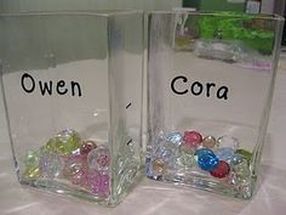Points for Grumpy"This response-cost strategy is appropriate for younger students who are verbally defiant and non-compliant with the teacher." (InterventionCentral, 2015).
|
|
|
Sample Jars
Evaluations, A. (2013, February 6). How to Address Children with Challenging Behaviors in an Early Childhood Environment (EC-4). Retrieved October 14, 2015. (Youtube video)
{Images of point jars} Kids Reward System. (n.d.). Retrieved October 14, 2015. https://www.pinterest.com/explore/kids-reward-system/
Research Confirms Benefit of Behavioral Interventions. (2011, November 15). Retrieved October 14, 2015.
Points For Grumpy (2015). Intervention Central. Retrieved from http://www.interventioncentral.org/behavioral-interventions/challenging-students/problem-student-behaviors
{Images of point jars} Kids Reward System. (n.d.). Retrieved October 14, 2015. https://www.pinterest.com/explore/kids-reward-system/
Research Confirms Benefit of Behavioral Interventions. (2011, November 15). Retrieved October 14, 2015.
Points For Grumpy (2015). Intervention Central. Retrieved from http://www.interventioncentral.org/behavioral-interventions/challenging-students/problem-student-behaviors




